Conjunctive Adverbs - Learn English Grammar
Oct 22, 2021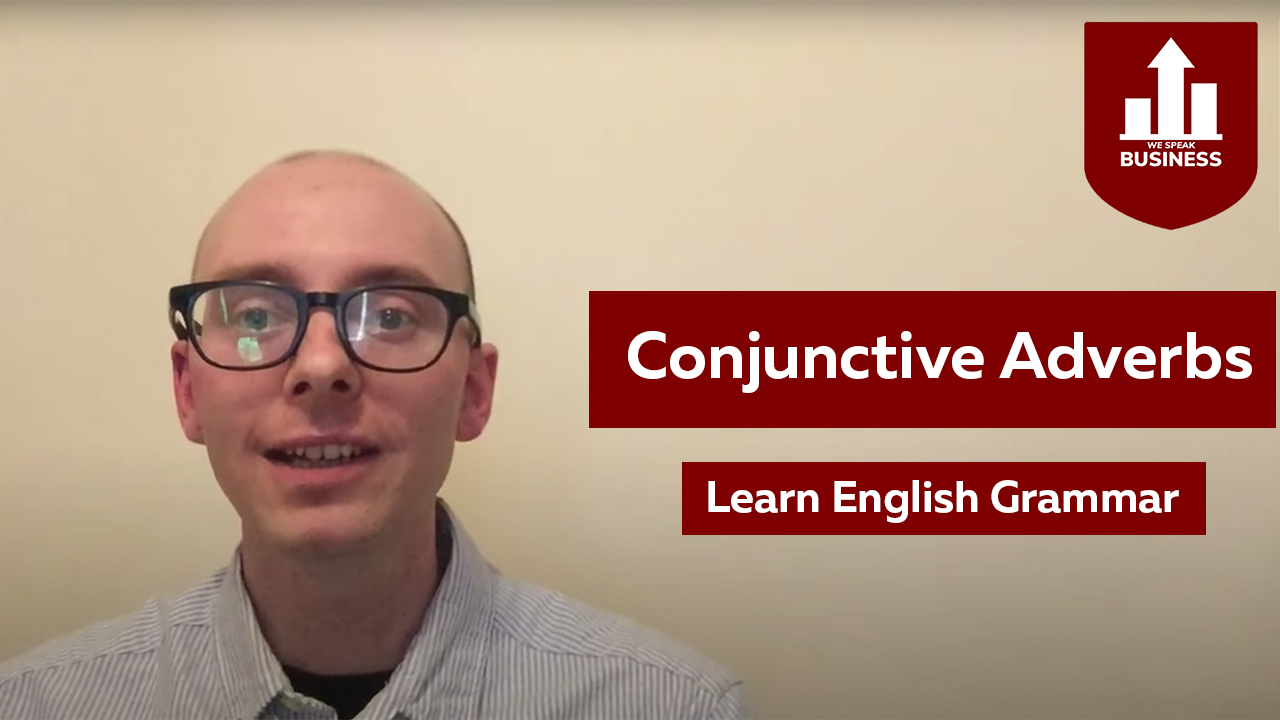
Conjunctions play an important role in English. They are the words responsible for linking two clauses together - both grammatically and by linking the meanings of the sentences together. Conjunctions allow us to link words, phrases and independent clauses together to show a relationship between the two ideas. There are coordinating conjunctions (and, or, but), subordinating conjunctions (after, because, than) and correlative conjunctions (either...or, whether...or, both...and) and we can use them to make a connection between clauses, words and phrases. However, these are not the only parts of speech that can link two separate ideas together.
In English, some adverbs appear in the conjunctive position which link two clauses together. While conjunctive adverbs do play a similar role as conjunctions (specifically coordinating conjunctions), they do not function in exactly the same way. Conjunctive adverbs can only link the two separate ideas in the clauses and not the two clauses grammatically. In this blog, we’ll take a closer look at what conjunctive adverbs are and how they differ from regular conjunctions. We will also cover the grammar and punctuation rules of conjunctive adverbs and how the rules differ from regular conjunctions.
What Is a Conjunctive Adverb?
A conjunctive adverb (also known as adverbial conjunction) is an adverb that is used to link two independent clauses together in a similar way standard coordinating conjunctions do. The role of the conjunctive adverb is to turn the clause that it introduces into an adverbial modifier of the previous clause. A conjunctive adverb cannot grammatically link two clauses together but it can make a meaning connection between the two separate clauses. This means that conjunctive adverbs draw a connection between two complete thoughts which turns the second clause into a clause that modifies the first clause.
The main difference between a conjunction and a conjunctive adverb is the fact that a conjunction links two clauses together both grammatically and in meaning and a conjunctive adverb can only make a meaning connection between the ideas in each clause. While the difference between conjunctions and conjunctive adverbs may appear to be merely a technicality, there are important differences in the punctuation rules they follow. Fortunately, it is the punctuation markers of conjunctive adverbs that make them easy to identify.
Below are example sentences using conjunctions and conjunctive adverbs for the sake of comparison. It’s important to note that conjunctive adverbs act as conjunctions but they are not the same as conjunctions.
For example:
A conjunction can link two clauses or phrases without mandatory punctuation:
“It is sunny and warm today.”
“I like pizza but I don’t like pasta.”
“I’ll go tonight if I have free time.”
“He didn’t go out last night because he had work to do.”
In the above examples, ‘and,’ ‘but,’ ‘because,’ and ‘if’ are the conjunctions. They can link the two clauses together without any additional punctuation. This means that they grammatically link the sentences together while drawing the connection between the two ideas.
In contrast:
“I like going to the park; however, it gets very crowded on the weekends.”
“It rained on my wedding day. Thus, I was quite upset.”
“She went to bed early last night. Nonetheless, she was still exhausted this morning.”
“It didn’t matter too much; besides, there were other things to worry about.”
In these examples, ‘however,’ ‘thus,’ ‘nonetheless,’ and ‘besides’ are conjunctive adverbs. They cannot link the sentences together and, therefore, they do require mandatory punctuation. However, they still draw a connection between the clause that follows the conjunctive adverb and the verb in the first clause.
Conjunctive adverbs are first and foremost adverbs. They do not change their part of speech because they play the part of a conjunction. These words cannot be considered to be conjunctions. They are adverbs that behave in a similar way to conjunctions. Conjunctions and conjunctive adverbs both belong to the broader ‘connector’ word family.
A conjunctive adverb is different from a standard adverb because an adverb only modifies the verb in one sentence, whereas, a conjunctive adverb forms the whole clause it begins into an adverbial modifier of the clause preceding it. Conjunctive adverbs create a flow to transition smoothly from one idea into another idea.
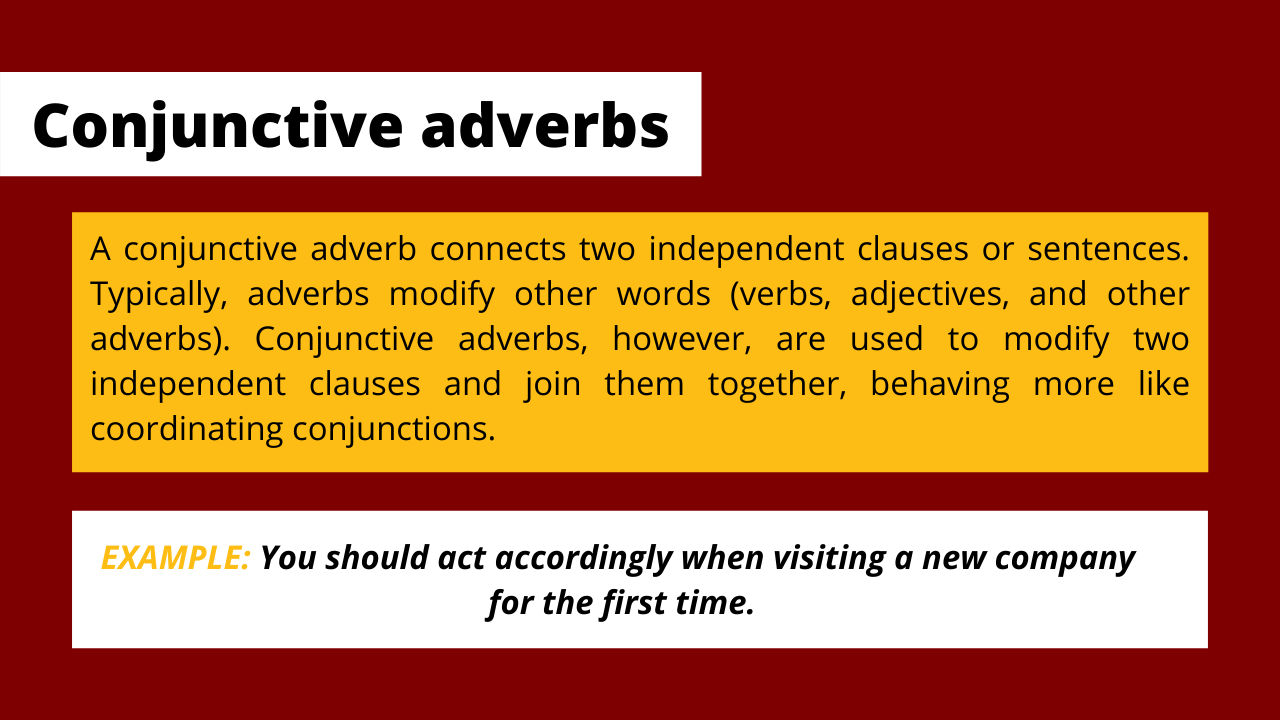
How Do You Identify Conjunctive Adverbs?
Conjunctive adverbs indicate that the clause which follows it modifies the previous clause; thereby, linking the two separate ideas in a similar way to conjunctions. However, a conjunctive adverb must be preceded by a full stop (.) or a semicolon (;) and it must be followed by a comma (,).
What is a Conjunctive Adverb in a Sentence?
The clause that the conjunctive adverb introduces becomes an adverbial modifier of the previous clause. In the example sentences: “I wanted to go; however, I was busy.” and “I wanted to go. However, I was busy.” ‘However’ is the conjunctive adverb that indicates that the following clause is linked to the previous clause.
Examples of Conjunctive Adverbs
We can separate conjunctive adverbs into different categories because each one has a different meaning. They all help ideas to flow into one another but show different relationships between the clauses. Some conjunctive adverbs show a continuation, or a natural conclusion, while others indicate that something happens despite the first clause and others show a contrast between the ideas in each clause.
The conjunctive adverb that you choose depends on the message you want to convey.
If you would like to clarify the first clause then use:
- For example
- As an example
- Naturally
- Understandably
- Predictably
- In fact
- For instance
If you would like to compare or contrast the two ideas:
- Alternatively
- Likewise
- Similarly
- However
- Conversely
- Instead
- However
- Nevertheless
If you would like to show a continuation:
- Then
- So
- Still
- Next
If you would like to express a consequence or lack thereof:
- Accordingly
- Nonetheless
- Consequently
- Thus
- Therefore
- Thereafter
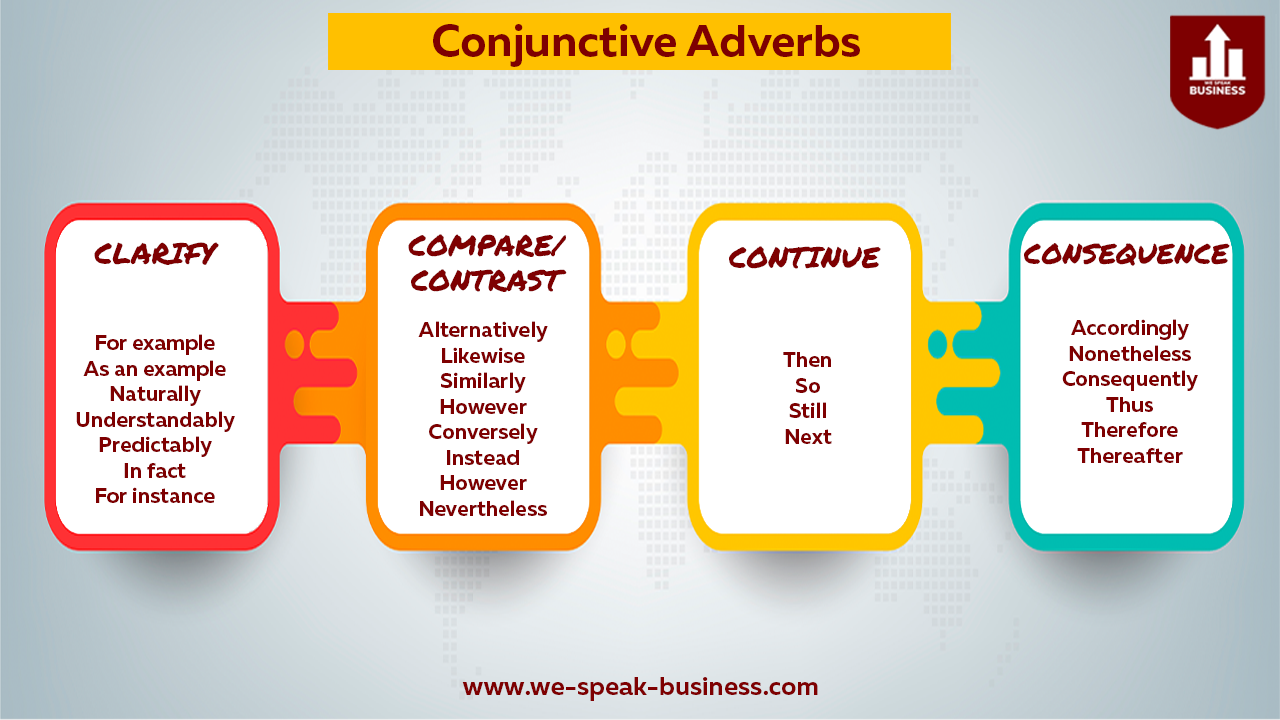
What is We Speak Business Program
We Speak Business is an English course with live speaking lessons for English learners who want speaking practice with native speakers, professional teachers, and students from around the world.
You have live speaking lessons where you can join and start speaking business English every day. There's a lesson every day and also, you can review all record lessons. There is a lot of conversation practice for each level of English (A2, B1-B2, C1). There is a calendar of scheduled lessons so you can see when lessons are and at what time you can join and start speaking.
In We Speak Business program, you have 24/7 support and also you have student chat where you can speak with other students from all around the world. Before you join our program and start speaking business English, we strongly recommend you sign up for our free seminar with Andrew Smith, where you can learn:
- What goals you need to have to get better results
- How to master business English quickly
- What are the strategies that will help you advance to a higher level
- How you can speak business English more fluently and confidently
- Free resources to help you learn business English
- An exclusive resource to improve your speech
Sentences With Conjunctive Adverbs
Sentences with conjunctive adverbs are structured differently from sentences with conjunctions. As previously mentioned, conjunctive adverbs require extra punctuation and cannot join two clauses without taking a semicolon (;) or a full stop (.) before it and a comma (,) after it. Conjunctions, in contrast, usually don’t have any extra punctuation around them; however, they can have a comma either before or after - but never both before and after.
- I went to the shops today. Unsurprisingly, they didn’t have my favourite cookies in stock. They are always sold out.
- They didn’t have my favourite cookies; otherwise, I would have bought them.
- He got distracted while he was cooking. Consequently, he burnt the food.
- It rained all throughout my holiday. Still, I had a great time.
- I thought it was a terrible idea. Indeed, it was.
- My daughter didn’t want to go to school today. Also, she wanted to go to the park.
- There are some problems in our city. Nonetheless, we must return to it as we don’t have anywhere else to go.
- Your new apartment is in a great location. Furthermore, it has everything you need.
- He is a great dad and husband. Besides, don’t we all have a few flaws?
- The dog always misbehaves. So, we will need to take it for some training.
- He was furious. Nonetheless, he forgave the children for breaking the window.
- My sister forgot her homework at home. Consequently, she received detention from her teacher.
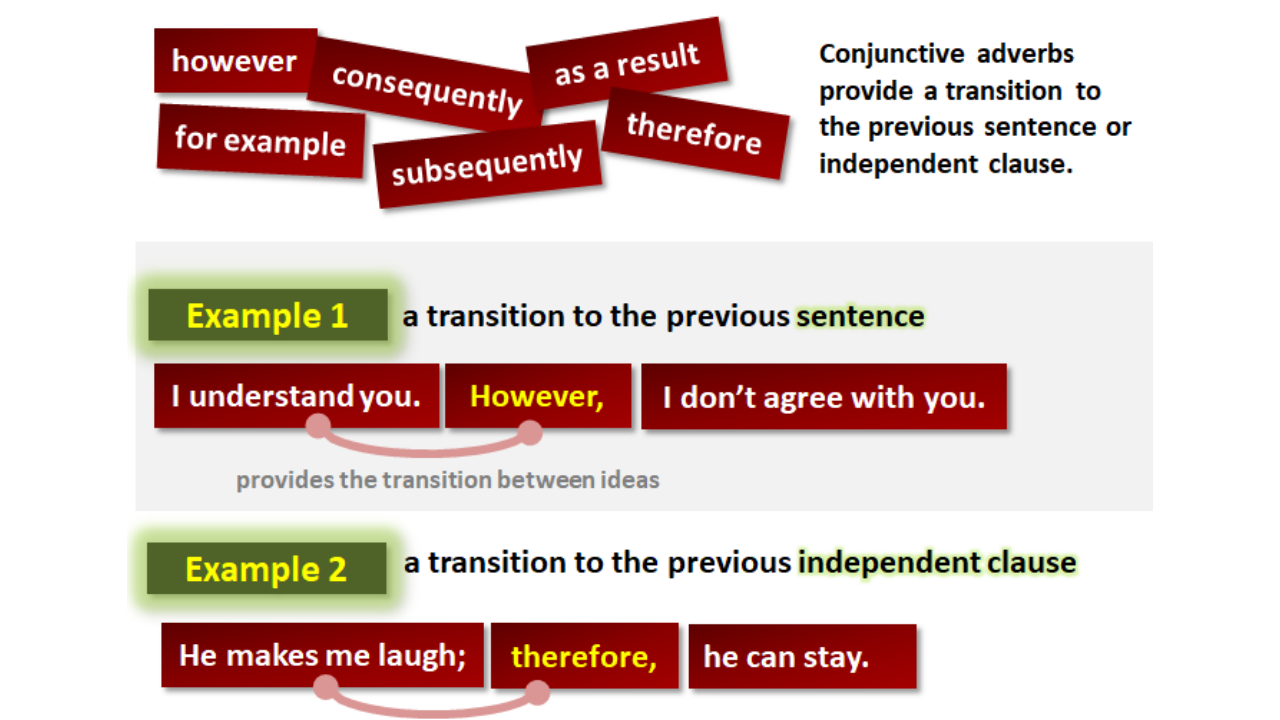
List of Conjunctive Adverbs
Not all adverbs can be used as conjunctive adverbs and not all adverbial conjunctions can be used as regular adverbs. However, there are some adverbs and adverbial conjunctions can be used in both positions. For example, “she finally arrived” which is the regular adverb usage of ‘finally’ vs “he’s been waiting for an hour. Finally, she has arrived,” which is the conjunctive adverb usage.
There are countless conjunctive adverbs in English and it can be difficult to memorize all of them. The best way to ensure that you are building your understanding and improving your use of conjunctive adverbs is to expose yourself to English as often as possible. You can expose yourself to these words by listening to or reading English regularly and you can practice your use of conjunctive adverbs by speaking and writing. Regular English speaking practice is vital for improving your overall language ability. It is a waste of time to learn countless lists of words and new vocabulary and never put them into use. In addition, it can take up to 17 exposures to a word to remember it. So, getting adequate and regular exposure to English is the best method to successfully master the language.
Here is a list of the most common conjunctive adverbs in English:
- However
- Then
- Still
- Accordingly
- Nevertheless
- Nonetheless
- Notwithstanding
- Instead
- Finally
- Further
- Additionally
- For example
- For instance
- Anyhow
- Anyway
- So
- In fact
- Indeed
- Instead
- Irrespective
- In conclusion
- Finally
- Perhaps
- Rather
- So
- Therefore
- Thereafter
- Thus
- Similarly
- In a similar way
- In the meantime
- At the same time
- Simultaneously
- Hence
- Henceforth
- Namely
- Notably
- Certainly
- Also
- Besides
- Conversely
- In contrast
- Naturally
- Likewise
- Alternatively
- Moreover
- Consequently
- Undoubtedly
- Further
- Furthermore
- In addition to
- Predictably
- Unsurprisingly
- Surprisingly
- Incidentally
- Understandably
- Interestingly
- Next
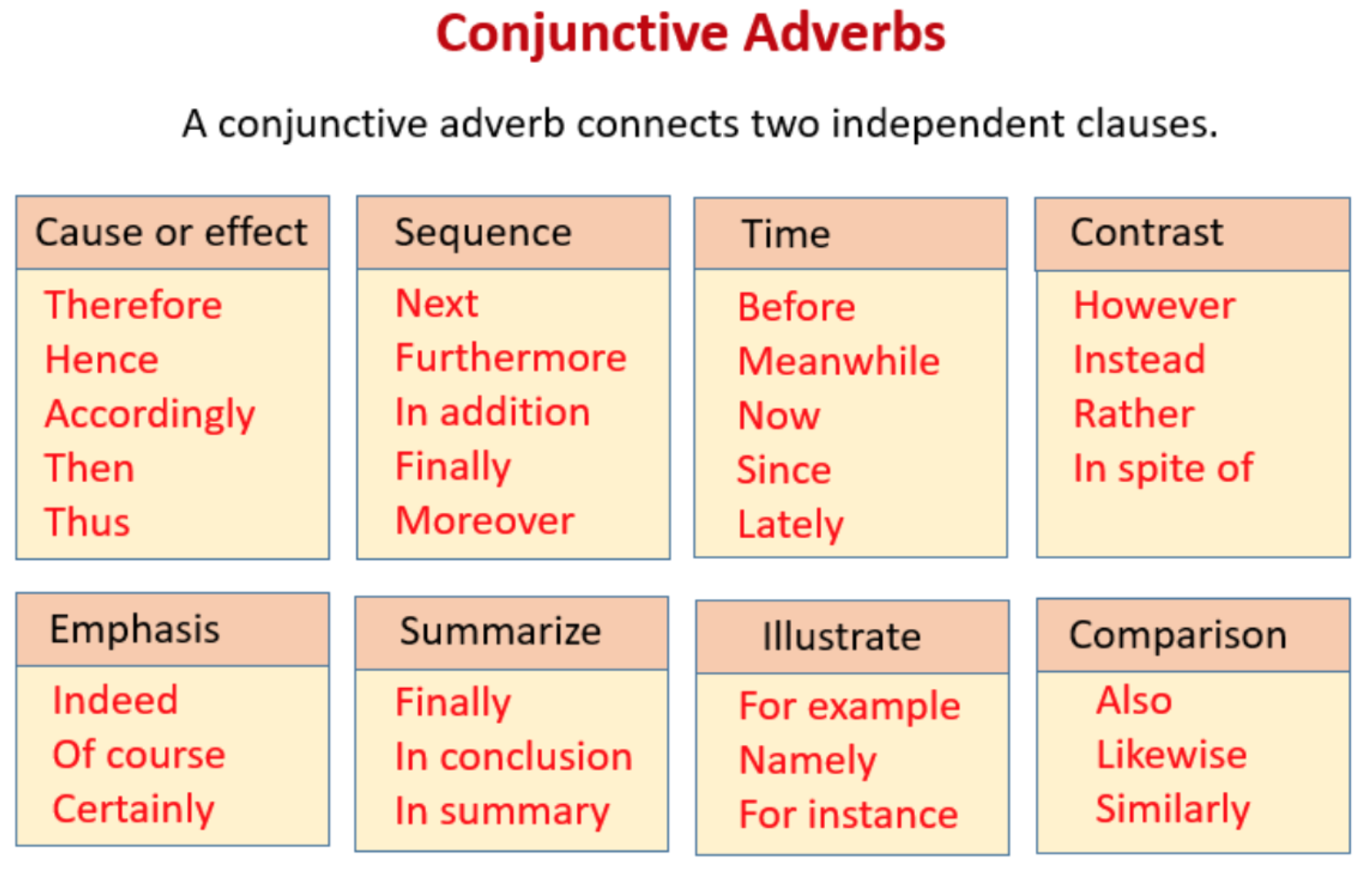
If you are looking to improve your speaking skills at work, then we have an exclusive free seminar where I teach you how to speak better business in 30 days. Sign up by clicking the button below!



